This article was medically reviewed by Jennifer Boidy, RN. Jennifer Boidy is a Registered Nurse in Maryland. She received her Associate of Science in Nursing from Carroll Community College in 2012.
This article has been viewed 14,979 times.
Swimming is a healthy and popular activity that many people enjoy year round. However, the chlorine that is added to pool water can irritate your skin and dry out your hair. Chlorine is a chemical used to kill micro-organisms that can cause health issues including gastroenteritis and ear infections.[1] It strips hair and skin of their oils and can lead to dryness. Chlorine can also make hair brittle and faded as well as skin red and itchy.[2] You can protect your hair and skin from chlorine by shielding and soothing them before and after your swim.
Steps
Treating Your Hair Before and After Swimming
-
1Wet your head. As tempting as a dive into the pool might be, take a minute to wet your hair in the shower before you swim. Wet hair is less likely to absorb chlorinated water than dry locks.
- Soak your hair in the shower until it is entirely saturated. This may feel like your head is heavy.
- Consider rinsing with cool water if you can. Warm water opens up the hair’s cuticle while cool water helps keep it closed. Using cool water may expose your hair to less chlorine.[3]
-
2Rub a protective layer on your locks. Your head will likely be in the water all or most of the time you’re in the water. Putting a protective barrier of a hair product or even coconut oil can keep too much chlorine from seeping into your strands.
- Cover all of your hair with a product such as an oil or silicone-based conditioner. Hair serums also work well. If you prefer a natural product, coconut oil is a great alternative.
- Recognize that protective layers of hair product or coconut oil will not leave a residue in the water.
Advertisement -
3Wear a swim cap. They aren’t the most fashionable swim accessories, but swim caps are another easy way to protect your hair from chlorine. A cap won’t keep all water or chlorine off of your hair, but it can minimize how much seeps into your locks.
- Purchase a latex or silicone swim cap. You can get these at sports stores, large retailers, and swimming stores.
-
4Wash out lingering chlorine and product. When you get out of the pool, it’s important to wash your hair. This will remove lingering barrier product and chlorine from you hair. It also prepares your hair for deep conditioning.
- Rinse your hair for a minute or two to remove the barrier product and any chlorine. This will allow any shampoo and conditioner to better penetrate your hair.
- You can also try an apple cider vinegar rinse to help get the chlorine out of your hair. After shampooing and rinsing your hair with plain water, rinse it again with a mixture of one part apple cider vinegar and two parts water. Then rinse your hair with plain water again.
-
5Condition your hair. Rinsing your hair with water and using a protective barrier is a great way to minimize the amount of chlorine your hair absorbs. But these still allow some chlorine to leech into your hair. This can strip it of its oil. Using a conditioner after shampooing can add moisture back to your hair. It may also minimize itchiness or irritation you may experience.[4]
- Use a product designed for deep conditioning. You can switch back to regular conditioner on the days you don’t swim.
- Consider spraying on a leave-in conditioner so that your hair gets the benefits of moisturize throughout the day.
Moisturizing Your Skin
-
1Rinse off before you get in the pool. Just like your hair, wet skin absorbs less chlorine than dry. When you wet your hair in the shower before you swim, make sure that the water hits your skin—and swimsuit—as well. This can offer some measure of protection against chlorine on your skin. It can also keep the color of your swimsuit fresher for a longer period of time.[5]
-
2Avoid protective barriers on skin. Unlike your hair, a protective layer won’t keep chlorine off of your skin. This includes even the heartiest barriers such as petroleum jelly. Protective skin barriers can also react with the water’s chemistry by producing more molecules that can irritate skin and hair.
-
3Shower as soon as possible after you swim. Although you can’t protect your skin against chlorine as well as your hair, you can minimize any potential dryness and irritation. Taking a shower as soon as you get out of the pool can get the chlorine off of your skin.
- Consider getting a shower gel or wash with vitamin C. This can help further neutralize the chlorine on your skin and get it to wash away.
-
4Apply a moisturizer. Since chlorine strips your skin of its natural oils, preventing further dryness is the best way to protect your skin. Applying a moisturizer after every swim can add oil back to your skin and help keep it moisturized. Moisturizer can also minimize your risk for irritated skin or rashes.
- Use a moisturizer that is high in antioxidants such as vitamins C and E. These are not only very high in moisture, but can further neutralize any lingering chlorine on your skin.
- Select a moisturizer that is a heavy cream instead of a lotion. Thicker products are generally more moisturizing than thinner ones.
Expert Q&A
Did you know you can get expert answers for this article?
Unlock expert answers by supporting wikiHow
-
QuestionWhat can I put on my hair to protect it from chlorine?
 Arthur SebastianArthur Sebastian is the Owner of Arthur Sebastian Hair Salon in San Francisco, California. Arthur has worked as a hair stylist for over 20 years and received his Cosmetology License in 1998. He believes that the true work of a successful hair stylist comes from passion and a love for hairdressing.
Arthur SebastianArthur Sebastian is the Owner of Arthur Sebastian Hair Salon in San Francisco, California. Arthur has worked as a hair stylist for over 20 years and received his Cosmetology License in 1998. He believes that the true work of a successful hair stylist comes from passion and a love for hairdressing.
Professional Hair Stylist Try putting conditioner in your swim cap to create a buffer. The swimming cap will keep most of your hair away from the water, but the conditioner adds another layer of protection. If chlorine does get into your hair, the conditioner can minimize some of the adverse effects that chlorine has on your hair.
Try putting conditioner in your swim cap to create a buffer. The swimming cap will keep most of your hair away from the water, but the conditioner adds another layer of protection. If chlorine does get into your hair, the conditioner can minimize some of the adverse effects that chlorine has on your hair.
References
- ↑ https://chlorine.americanchemistry.com/Chlorine/Pool-Treatment-101/
- ↑ http://news.health.com/2013/07/03/chlorine/
- ↑ http://www.goodhousekeeping.com/beauty/hair/tips/a19894/mistakes-washing-your-hair/
- ↑ http://www.self.com/story/5-ways-to-protect-your-hair-pr
- ↑ http://www.freedrinkingwater.com/water-education3/7-water-swimming-chlorine-page2.htm
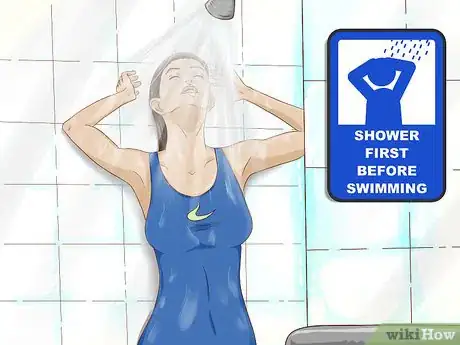
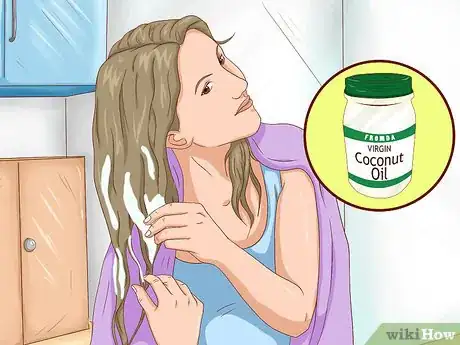
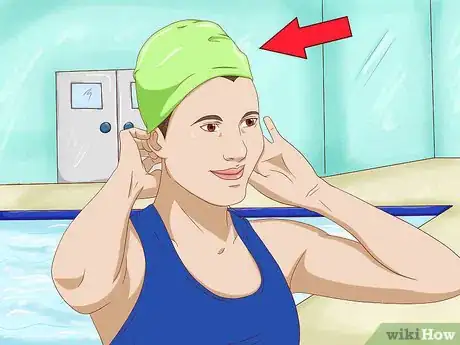
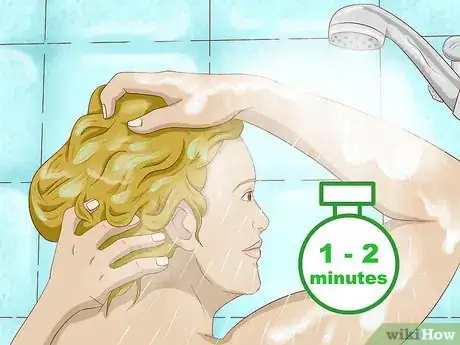
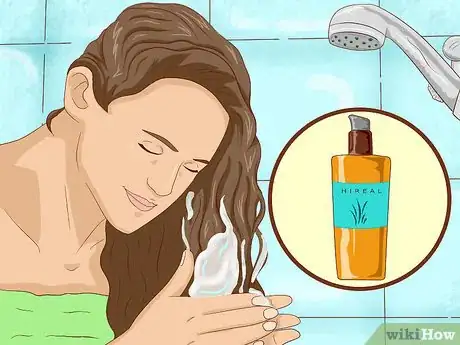
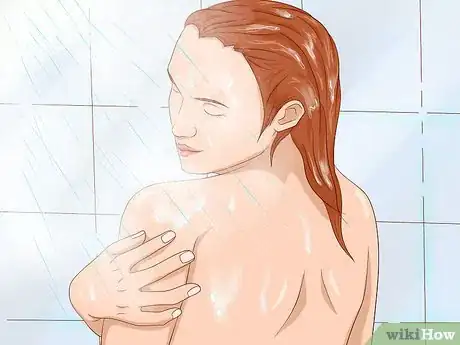
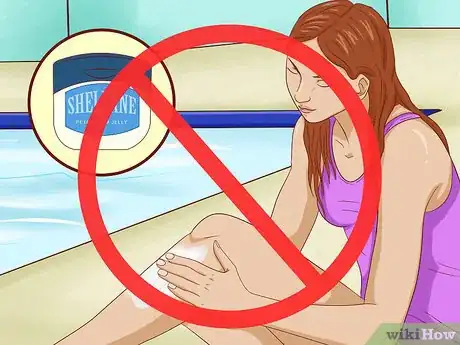
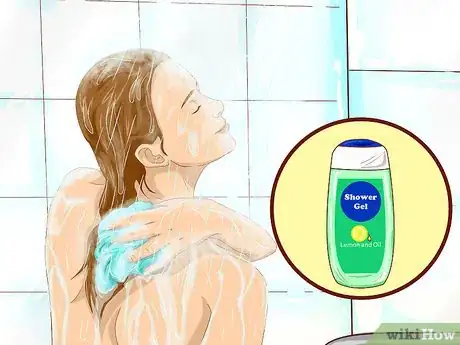
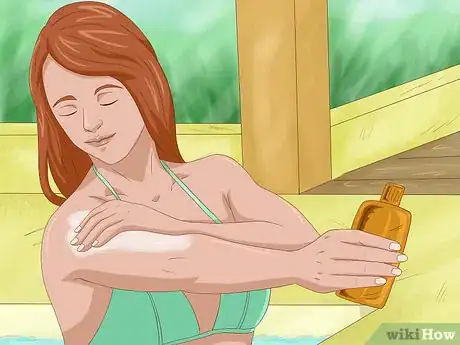





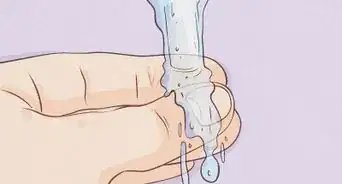
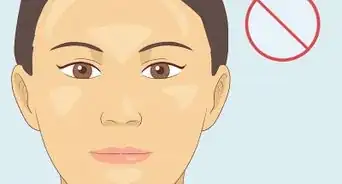

-Step-12-Version-3.webp)

















































